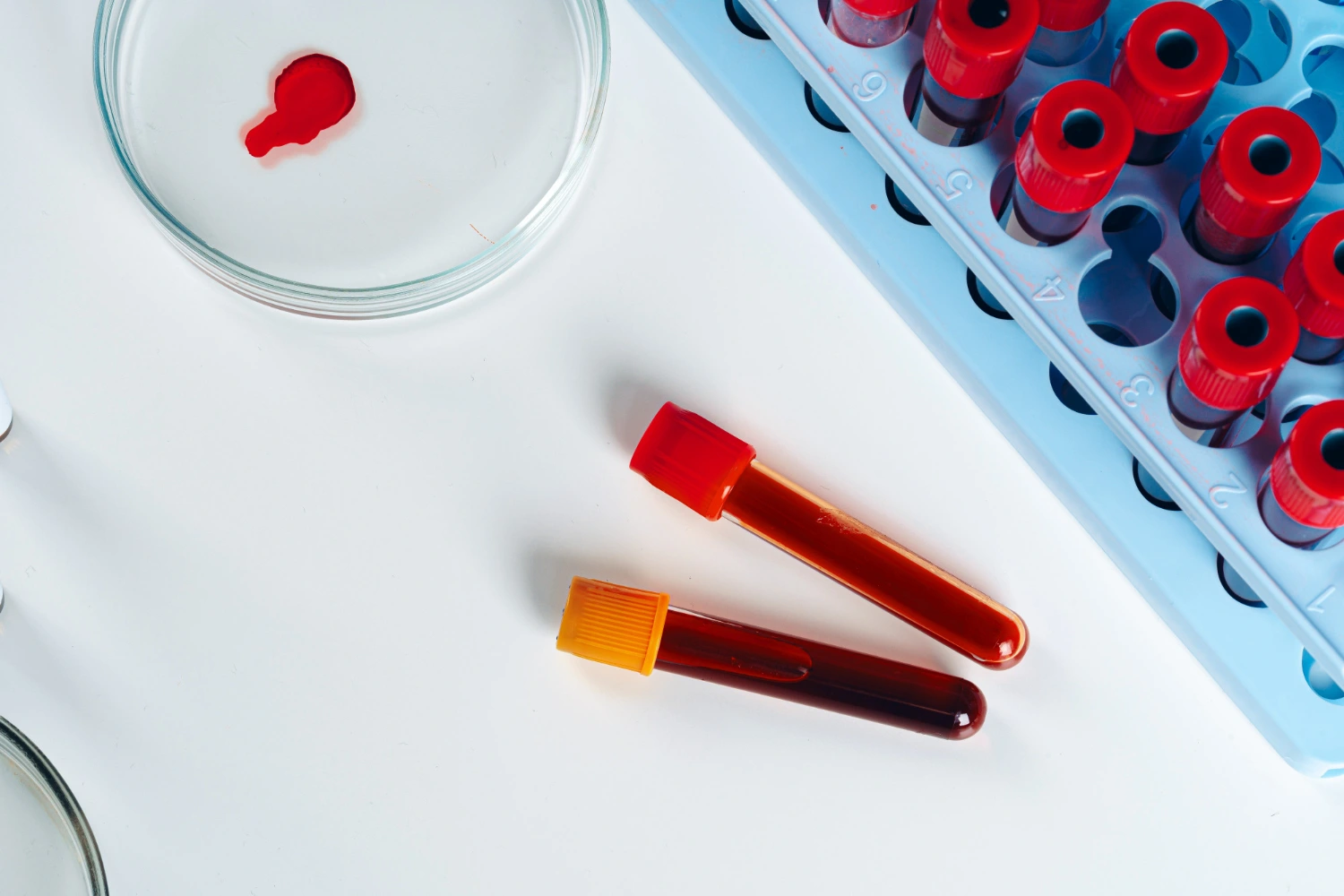Blood tests are one of the most powerful tools in modern medicine, offering insights into a patient’s health long before symptoms of disease appear. By providing early indications of conditions such as cancer, diabetes, heart disease, and liver disorders, blood tests allow for timely interventions that can significantly improve treatment outcomes. Regular screening can catch health problems early when they are easier to treat, making it essential for individuals to understand the value of these tests and when they should be taken.
In This Article
In this article, we will explore 10 essential blood tests for early disease detection, explaining their purpose, benefits, drawbacks, and key considerations. Whether you are healthy and proactive about your wellness or looking to understand what tests to ask for, this comprehensive guide will help you navigate your options.
Complete Blood Count (CBC)
Purpose:
A Complete Blood Count (CBC) is a common blood test that measures the concentration of various blood components, including red blood cells, white blood cells, platelets, and hemoglobin. It is often used as a routine screening test to assess overall health and detect a wide range of conditions, from anemia to infection and leukemia.
Why It Matters:
The CBC provides essential information about your blood health. It helps identify conditions that might not yet show symptoms, such as anemia or infections. Early detection of abnormalities in blood cell counts can guide further diagnostic testing and early interventions.
How It Works:
The CBC involves drawing a small sample of blood, which is then analyzed in a lab. The test measures the number of cells in the blood and evaluates their size, shape, and type.
What It Detects:
- Anemia (low red blood cell count)
- Infections or inflammation (high white blood cell count)
- Blood clotting disorders (platelet count abnormalities)
- Leukemia and other blood cancers (abnormal cell types)
Pros:
- Fast and inexpensive
- Provides a broad overview of general health
- Can identify various conditions early, including infections, anemia, and leukemia
Cons:
- Not diagnostic on its own; it requires follow-up tests for specific conditions
- Can produce false positives or negatives, leading to unnecessary additional testing
Factors to Consider:
- Regular CBCs are recommended during annual check-ups or when symptoms of infection, fatigue, or bleeding arise.
- Consult with a doctor if there’s a family history of blood disorders like anemia or leukemia.
- Certain medications can affect CBC results, so be sure to inform your healthcare provider of all medications you’re taking.
Interpreting Results:
- Low red blood cell count: Could indicate anemia, which may require treatment such as iron supplements or diet changes.
- High white blood cell count: May suggest an ongoing infection or an autoimmune disorder.
- Abnormal platelet count: Could indicate a bleeding disorder or bone marrow issue, necessitating further evaluation.
Lipid Panel
Purpose:
A lipid panel measures the levels of various types of cholesterol in the blood, including low-density lipoprotein (LDL), high-density lipoprotein (HDL), and total cholesterol, along with triglycerides. This test is vital in evaluating cardiovascular health and the risk of heart disease.
Why It Matters:
High levels of LDL cholesterol (often called “bad” cholesterol) and triglycerides can increase the risk of heart disease, heart attacks, and stroke. The lipid panel helps identify whether you’re at risk and provides an opportunity for early intervention.
How It Works:
After a fasting period of 9-12 hours, a blood sample is drawn and analyzed to measure lipid levels. The test typically evaluates:
- Total cholesterol
- LDL (bad) cholesterol
- HDL (good) cholesterol
- Triglycerides
What It Detects:
- High cholesterol levels (which can lead to plaque buildup in the arteries)
- Risk of heart disease and stroke
- Abnormal fat metabolism
Pros:
- Critical for evaluating cardiovascular risk
- Can help identify early signs of heart disease before symptoms arise
- Allows for lifestyle changes (diet, exercise) or medication to manage risk
Cons:
- Fasting requirement may be inconvenient for some patients
- Single test results can vary with lifestyle changes, so it may need to be repeated periodically
Factors to Consider:
- Regular testing is especially important for those over 40, or those with a family history of heart disease.
- Ensure you fast for 9-12 hours before the test for accurate results.
- Lifestyle factors, such as diet and physical activity, significantly influence lipid levels, so discuss any recent changes with your doctor.
Interpreting Results:
- High LDL cholesterol: Increases risk of atherosclerosis (hardening of the arteries) and cardiovascular disease.
- Low HDL cholesterol: Increases risk of heart disease; aim to increase with exercise and healthy fats.
- Elevated triglycerides: May indicate metabolic syndrome, obesity, or diabetes.
Blood Glucose Test
Purpose:
The blood glucose test measures the amount of sugar (glucose) in your blood and is used to assess the risk of diabetes and monitor blood sugar control for individuals already diagnosed with the condition.
Why It Matters:
Elevated blood glucose levels can indicate prediabetes or diabetes. Early detection through a blood glucose test helps prevent long-term complications of diabetes, such as kidney disease, neuropathy, and cardiovascular problems.
How It Works:
A blood sample is drawn after a fasting period of at least 8 hours, or the test can be taken at any time of day. Results are measured in milligrams of glucose per deciliter (mg/dL).
What It Detects:
- Prediabetes or diabetes (elevated blood glucose levels)
- Poor blood sugar control in diabetic patients
- Risk of metabolic disorders
Pros:
- Simple and inexpensive test
- Key tool in managing diabetes and prediabetes
- Can identify early signs of metabolic syndrome
Cons:
- Requires fasting for the most accurate results
- Single test results may not be sufficient; additional tests (like HbA1c) may be necessary for diagnosis
Factors to Consider:
- The blood glucose test is commonly used for routine screening in individuals over 45, or those with risk factors like obesity, family history of diabetes, or high blood pressure.
- Individuals with symptoms like increased thirst, fatigue, or frequent urination should consider testing sooner.
Interpreting Results:
- Blood glucose <100 mg/dL: Normal
- Blood glucose between 100-125 mg/dL: Prediabetes
- Blood glucose ≥126 mg/dL: Diabetes (requires confirmation with additional tests)
Liver Function Tests
Purpose:
Liver function tests (LFTs) evaluate the health of the liver by measuring the levels of enzymes, proteins, and substances in the blood that are processed by the liver. These tests are used to detect liver diseases such as hepatitis, cirrhosis, or liver damage caused by alcohol or drugs.
Why It Matters:
The liver plays a crucial role in detoxifying the body, metabolizing nutrients, and producing proteins essential for blood clotting. Detecting liver dysfunction early can prevent irreversible damage and improve treatment outcomes.
How It Works:
Blood samples are taken to measure specific enzymes and proteins, such as alanine aminotransferase (ALT), aspartate aminotransferase (AST), and bilirubin.
What It Detects:
- Liver diseases (hepatitis, cirrhosis, fatty liver disease)
- Alcohol-related liver damage
- Drug-induced liver injury
- Bile duct blockages
Pros:
- Early detection of liver disease can prevent long-term damage
- Can help monitor ongoing liver conditions and the effectiveness of treatments
- Non-invasive and relatively quick test
Cons:
- Elevated liver enzymes can also occur with non-liver-related conditions
- Liver function tests alone cannot diagnose specific liver conditions, additional tests are usually needed
Factors to Consider:
- Liver function tests are typically used for individuals at risk of liver disease, including those who drink heavily, have a history of liver problems, or are on medications that can affect liver health.
Interpreting Results:
- Elevated ALT and AST levels: May indicate liver inflammation, hepatitis, or alcohol-induced damage
- High bilirubin: May suggest jaundice or bile duct obstruction
- Low albumin: Can indicate liver cirrhosis or chronic liver disease
Thyroid Function Tests
Purpose:
Thyroid function tests measure the levels of thyroid hormones (T3, T4, and TSH) in the blood to assess the functioning of the thyroid gland. These tests are crucial for diagnosing thyroid disorders such as hypothyroidism, hyperthyroidism, and other thyroid-related conditions.
Why It Matters:
The thyroid gland regulates metabolism, energy levels, and body temperature. Any imbalance in thyroid hormone levels can lead to serious health issues, including fatigue, weight gain, weight loss, and heart problems. Early detection allows for timely treatment, preventing complications.
How It Works:
The most common thyroid function tests include the TSH (thyroid-stimulating hormone) test, Free T4, and Free T3 tests. Blood is drawn to measure the levels of these hormones, and the results help determine whether the thyroid is underactive (hypothyroidism) or overactive (hyperthyroidism).
What It Detects:
- Hypothyroidism (underactive thyroid)
- Hyperthyroidism (overactive thyroid)
- Autoimmune thyroid disorders (Hashimoto’s disease, Graves’ disease)
- Thyroid cancer in certain cases
Pros:
- Critical for diagnosing thyroid disorders, which can impact many body systems
- Can help with weight management, mood swings, and energy levels
- Simple and relatively inexpensive test
Cons:
- Requires follow-up tests for a full diagnosis
- Thyroid hormone levels can fluctuate with factors like pregnancy or stress, so multiple tests may be needed
Factors to Consider:
- Thyroid tests are typically recommended if you have symptoms such as unexplained weight changes, fatigue, mood changes, or heat/cold intolerance.
- The risk of thyroid dysfunction increases with age, particularly in women over 60.
Interpreting Results:
- High TSH, low T4: Indicates hypothyroidism (underactive thyroid)
- Low TSH, high T4/T3: Indicates hyperthyroidism (overactive thyroid)
- Abnormal levels of antibodies: Suggests an autoimmune thyroid disorder
Prostate-Specific Antigen (PSA) Test
Purpose:
The PSA test measures the level of prostate-specific antigen, a protein produced by the prostate gland. This test is used primarily to screen for prostate cancer, although elevated PSA levels can also indicate benign prostate conditions.
Why It Matters:
Prostate cancer is one of the most common cancers in men. Early detection through the PSA test can lead to earlier diagnosis and treatment, potentially saving lives. However, elevated PSA levels can also be caused by non-cancerous conditions like benign prostatic hyperplasia (BPH).
How It Works:
A blood sample is taken and tested for the level of PSA. Typically, men with higher PSA levels may be recommended for further diagnostic testing, such as a biopsy.
What It Detects:
- Prostate cancer
- Benign prostate conditions, such as BPH
- Prostatitis (inflammation of the prostate)
Pros:
- Can detect prostate cancer early when it is more treatable
- Can also help monitor the progression of prostate cancer or other prostate conditions
Cons:
- Elevated PSA levels don’t necessarily indicate cancer and can lead to unnecessary biopsies
- The test has a relatively high false positive rate
- Not recommended for all men, especially those with a low risk of prostate cancer
Factors to Consider:
- Men over 50, or those with a family history of prostate cancer, are generally advised to discuss PSA screening with their doctor.
- The PSA test is not recommended for men with a low risk of prostate cancer, as it may result in unnecessary tests or treatments.
Interpreting Results:
- PSA levels between 0 and 4 ng/mL: Generally considered normal, but levels should be monitored
- PSA levels above 4 ng/mL: May require further investigation, including a biopsy
- PSA levels higher than expected in older men: May indicate the need for more aggressive screening
C-Reactive Protein (CRP) Test
Purpose:
The C-reactive protein (CRP) test measures the level of CRP in the blood, a substance produced by the liver in response to inflammation. Elevated CRP levels are a marker of inflammation in the body and can indicate conditions such as infections, autoimmune disorders, or heart disease.
Why It Matters:
Chronic inflammation is linked to many diseases, including cardiovascular disease, arthritis, and inflammatory bowel disease. CRP testing can help identify inflammation early and provide insights into the effectiveness of treatments.
How It Works:
A blood sample is taken and analyzed for CRP levels. Higher CRP levels suggest the presence of inflammation, which could indicate a wide range of health issues.
What It Detects:
- Inflammatory conditions (arthritis, lupus, IBD)
- Heart disease risk
- Infections
- Autoimmune diseases
Pros:
- Simple, inexpensive test that can detect inflammation early
- Can help monitor chronic conditions or infection progression
- Useful for assessing cardiovascular health risk
Cons:
- CRP levels are nonspecific and can be elevated due to a variety of conditions
- The test does not identify the specific cause of inflammation, so additional tests may be needed
Factors to Consider:
- CRP testing is often used for people at risk of cardiovascular diseases or those with conditions that cause chronic inflammation.
- It is commonly included as part of a broader diagnostic workup for unexplained symptoms like fatigue, fever, or joint pain.
Interpreting Results:
- Low CRP levels (<1 mg/L): Indicates a low risk of heart disease
- Moderate CRP levels (1-3 mg/L): Suggests a moderate risk of cardiovascular disease
- High CRP levels (>3 mg/L): May indicate significant inflammation, requiring further investigation
Vitamin D Test
Purpose:
The vitamin D test measures the amount of vitamin D in the blood, which is essential for maintaining healthy bones, immune function, and overall health. Low levels of vitamin D can lead to conditions like osteoporosis and contribute to autoimmune disorders.
Why It Matters:
Vitamin D deficiency is more common than many realize, especially in people who have limited sun exposure or live in regions with long winters. Deficiency can increase the risk of bone fractures, heart disease, and autoimmune conditions.
How It Works:
The test measures the level of 25-hydroxyvitamin D, which is the major circulating form of vitamin D in the blood.
What It Detects:
- Vitamin D deficiency
- Bone diseases like osteoporosis and rickets
- Increased risk of cardiovascular disease or autoimmune conditions
Pros:
- Easy and inexpensive test
- Helps identify vitamin D deficiencies that can be treated through supplements or dietary changes
- Critical for bone health and immune system function
Cons:
- Low vitamin D levels can be a sign of several conditions and may require additional tests
- Supplementation may be necessary if vitamin D levels are low, but too much supplementation can lead to toxicity
Factors to Consider:
- People with limited sun exposure, darker skin, or those who live in northern latitudes should consider regular vitamin D testing.
- Individuals with bone health concerns, such as osteoporosis, should also monitor their vitamin D levels.
Interpreting Results:
- Vitamin D levels of 20-50 ng/mL are generally considered normal
- Levels below 20 ng/mL: Indicate deficiency and may require supplementation
- Levels above 100 ng/mL: Could indicate toxicity and require adjustment of vitamin D intake
Hemoglobin A1c (HbA1c) Test
Purpose:
The Hemoglobin A1c (HbA1c) test measures the average blood glucose levels over the past 2-3 months. This test is commonly used to diagnose and monitor diabetes.
Why It Matters:
It is crucial for managing diabetes and preventing long-term complications like neuropathy, kidney damage, and heart disease. Regular HbA1c testing helps keep blood sugar levels under control and assess how well treatment plans are working.
How It Works:
A blood sample is drawn to measure the percentage of hemoglobin that is coated with sugar. The higher the percentage, the higher the blood sugar levels have been over the past 2-3 months.
What It Detects:
- Diabetes
- Prediabetes
- Poor blood sugar control in people already diagnosed with diabetes
Pros:
- No fasting required
- Provides a long-term view of blood sugar control
- Helps manage and prevent diabetes-related complications
Cons:
- Can be influenced by factors like anemia, blood loss, or other conditions
- Does not provide immediate blood sugar information (only averages over time)
Factors to Consider:
- Regular HbA1c testing is essential for individuals with diabetes to track their long-term blood sugar control.
- Individuals with prediabetes or a family history of diabetes should discuss testing with their doctor.
Interpreting Results:
- HbA1c below 5.7%: Normal
- HbA1c 5.7% – 6.4%: Prediabetes
- HbA1c 6.5% or higher: Diabetes
Kidney Function Tests
Purpose:
Kidney function tests measure how well the kidneys are filtering waste from the blood. These tests typically include measuring creatinine and blood urea nitrogen (BUN) levels to assess kidney health.
Why It Matters:
The kidneys play a vital role in filtering out waste products and maintaining fluid balance in the body. Kidney disease often develops silently, making early detection through these tests critical for preventing kidney failure.
How It Works:
Blood samples are analyzed to measure the levels of creatinine and BUN, both of which are waste products filtered by the kidneys. High levels can indicate kidney dysfunction.
What It Detects:
- Kidney disease (acute or chronic)
- Dehydration
- Kidney damage from conditions like diabetes or high blood pressure
Pros:
- Crucial for early detection of kidney disease
- Can help monitor kidney function for individuals with diabetes, hypertension, or a history of kidney problems
Cons:
- Results can be influenced by factors like dehydration or muscle mass
- Additional tests, such as urine tests or imaging, may be needed for a complete diagnosis
Factors to Consider:
- Kidney function tests are particularly important for people with diabetes, high blood pressure, or a family history of kidney disease.
Interpreting Results:
- Normal creatinine levels: 0.6 to 1.2 mg/dL
- Elevated creatinine or BUN: May indicate kidney dysfunction or damage
- Consistently high levels may suggest the need for further evaluation
Conclusion
Regular blood tests are an indispensable tool for detecting serious health conditions early, often before symptoms arise. By identifying potential issues such as heart disease, diabetes, or cancer in their early stages, these tests empower individuals to take proactive steps toward improved health outcomes.
Each test serves a unique purpose, from tracking overall wellness with a Complete Blood Count (CBC) to screening for prostate cancer with a PSA Test. Together, they provide a comprehensive picture of internal health, supporting both prevention and ongoing management of chronic conditions.
General Health and Organ Function
| Blood Test | Purpose | Primary Conditions Detected |
|---|---|---|
| Complete Blood Count (CBC) | Assesses blood cell levels for overall health. | Anemia, infections, leukemia, clotting disorders. |
| Liver Function Tests (LFTs) | Evaluates liver enzymes and proteins. | Hepatitis, cirrhosis, liver damage. |
| Kidney Function Tests | Measures creatinine and BUN levels. | Kidney disease, dehydration, metabolic issues. |
Cardiovascular and Metabolic Health
| Blood Test | Purpose | Primary Conditions Detected |
|---|---|---|
| Lipid Panel | Measures cholesterol and triglycerides. | Heart disease, atherosclerosis, stroke risk. |
| Blood Glucose Test | Monitors blood sugar levels. | Prediabetes, diabetes, metabolic syndrome. |
| C-Reactive Protein (CRP) Test | Assesses inflammation linked to heart risks. | Inflammation, autoimmune diseases, heart disease risk. |
Hormonal and Nutritional Health
| Blood Test | Purpose | Primary Conditions Detected |
|---|---|---|
| Thyroid Function Tests | Measures T3, T4, and TSH hormone levels. | Hypothyroidism, hyperthyroidism, autoimmune thyroid disorders. |
| Vitamin D Test | Evaluates vitamin D levels for bone and immune health. | Vitamin D deficiency, osteoporosis, immune disorders. |
Cancer Screening and Monitoring
| Blood Test | Purpose | Primary Conditions Detected |
|---|---|---|
| Prostate-Specific Antigen (PSA) Test | Screens for prostate issues. | Prostate cancer, benign prostatic conditions. |
| Hemoglobin A1c (HbA1c) Test | Monitors average blood sugar control over 2-3 months. | Diabetes, prediabetes, poor glucose control. |
While blood testing is a powerful resource, it’s essential to approach it with balance. Routine screenings are most effective when guided by individual risk factors, family history, and medical advice. Consulting a healthcare provider ensures that testing is targeted, appropriate, and aligned with your health goals.
By integrating these essential blood tests into regular checkups, individuals can gain valuable insights that lead to timely interventions — ultimately improving both longevity and quality of life.
References
- American Society for Clinical Pathology (ASCP). Complete Blood Count (CBC).
- National Institute of Diabetes and Digestive and Kidney Diseases (NIDDK). Blood Tests & Diagnosis.
- American Heart Association (AHA). Lipid Panel.
- Centers for Disease Control and Prevention (CDC). Blood Glucose Test.
- American Liver Foundation. Liver Function Tests.
- American Thyroid Association (ATA). Thyroid Function Tests.
- American Cancer Society. Prostate-Specific Antigen (PSA) Test.
- National Institute of Arthritis and Musculoskeletal and Skin Diseases (NIAMS). C-Reactive Protein (CRP) Test.
- National Institutes of Health (NIH) Office of Dietary Supplements. Vitamin D Test.
- American Diabetes Association (ADA). Hemoglobin A1c (HbA1c) Test.









0 Comments